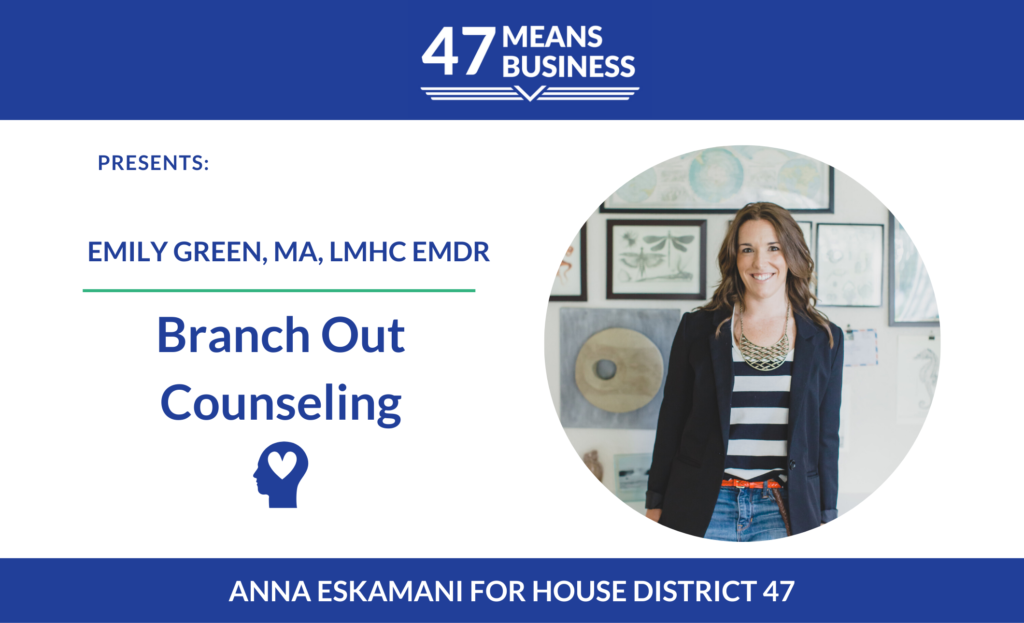Emily Green is a licensed mental health therapist in House District 47 who is EMDR trained and believes that everyone has the capacity to heal and grow. Emily provides individual counseling to teens, college students, adults and seniors and we were thrilled to spotlight her for this week’s #47MeansBusiness blog post, especially as many of us experience greater degrees of stress and anxiety during the coronavirus pandemic.
What inspired you to enter the mental health field?
I wanted to find another framework to understand how we as people can actually heal, grow, & change. Like a lot of people, I grew up within a cultural mindset that taught us to “suck it up” and that it’s better to “save face” than show your feelings. Sure, it instilled the capacity to endure; but, it simultaneously encouraged suffering instead of healing.
The mental health field promised healthier, more resilient ways to deal with life’s problems. It wasn’t limited to denial and sheer determination. It’s most basic assumption believed that we can actually do something to alleviate our suffering and that the task itself is worthwhile. For me, this recognized our innate capacity to heal and overcome. That inspired me and I wanted to learn more.
What is your favorite thing about working in district 47?
District 47 is jam packed with unique businesses that reveal the diversity, talent, & passions of the people who live here. It’s a business district rooted in community. I love being a part of that. There really is something for everyone here and you can always find something new to try, taste, & enjoy. Not to mention, you’ll meet the most interesting people in the process. FYI- for all my fellow sweet tooths, my office is dangerously close to the best dessert spots in town. Everyday I am tempted with Gideon’s Cookies and Kelly’s Homemade Ice Cream but I’m learning to cope 🙂
What is one piece of advice you could give to our readers about ending the stigma around mental health care?
It’s more socially acceptable for people to get counseling. But it still may be outside of people’s own set of personal norms. Deep down, I think so many of us are used to “handling hard” on our own that we don’t know when to reach out for help or even how. I think the best place to start would be giving yourself permission. Permission to notice when you’re having a hard time. Permission to be honest about when it feels like too much to handle on your own. Permission to do something different like get support from a professional instead of suffering alone. Something powerful happens when we give ourselves permission. We discover there are more options. With more options, we experience greater agency.
Do you have any advice for people who have considered seeking counseling but are nervous to take the first step?
Love this question!!! If you’re thinking about seeking counseling and your nerves are holding you back, there are a few things to remember that can help you take that first step with more confidence.
- It’s okay to be nervous. After all, you’re seeking help about a personal problem that’s
probably been stressing you out for a while now. It would actually be a little weird if you weren’t a bit antsy about it. The good news is you’re reaching out to professionals who want to help. Remember that!
- Find someone you “click” with by shopping around for a therapist. Most of us mental
health practitioners offer a free phone consultation. It’s about 15 minutes and it benefits both parties. During this chat, you’re evaluating if you could imagine working with this person. If you can’t, that’s okay. You don’t have to schedule an appointment. You can say “Thanks for your time. I’m not ready to book an appointment.” Side note: I don’t expect every person I speak with to turn into a client. Sometimes, I refer to another therapist who specializes in that person’s unique needs.
- Know your budget and how you want to pay for counseling services. During this free
consultation, you’ll want to know how much their fee is and what methods of payment they take. Being upfront about wanting to use insurance or how much you’ve budgeted is another helpful way of determining if this person is a good fit for you. Some therapists take insurance while others don’t. If you like the person but the fee is out of your range, you can ask if they offer any “sliding scale pricing.” It never hurts to ask. Side note: The great thing about where we live is we have such a wonderful, diverse, competent group of mental health practitioners. So you have a lot of options when it comes to “clicking” with someone and finding a practitioner that’s within your budget/insurance provider.
- There are many types of therapeutic modalities to help people heal and grow. As an
EMDR trained therapist, the approach I use is different than general talk therapy. During my chat with potential clients, I like to briefly share how I work with people and what informs the work I do. Asking your potential therapist about their work, approach, or specialities can help you make an informed decision about working with them and what kind of care you want to receive.
Our community is no stranger to gun violence. Have you seen this issue or other issues that have come as a result of our current political climate impact your clients or your field?
In my job, I am constantly reminded that we all fight invisible battles no one else sees. You could say I work solely with survivors. Sometimes it’s survivors of gun violence, grief, neglect,
assault, divorce, illness/injury, broken relationships, or abuse. Whatever the individual details or sources of trauma, the stories are all stories about survival.
To some degree, we will all be touched by trauma. The form it takes will be as diverse as people’s reactions to it. When a traumatic event occurs, it activates our survival defense mechanisms. Any responses we have to trauma are all normal reactions to abnormal circumstances, regardless of how common it is. If its repeated abuse, neglect or mass shootings, trauma never becomes normal.
As an EMDR trained therapist, trauma informs the work I do. Giving teens and adults a safe, supportive environment where they can do the inner work needed to heal and grow from their most distressing experiences and limiting beliefs is one of the things I love most about my job. I love it; because, the work doesn’t shy away from what’s difficult. It doesn’t turn a blind eye. The work turns toward it. That movement provides a conduit of healing that can restore or create for the very first time a felt sense of safety in the body. It can help someone learn how to feel safe when they are safe; so they’re not lit up or on edge all the time. The work can alleviate symptoms and breakthrough bad patterns by teaching healthy ways to cope and regulate the nervous system when triggered.
Trauma can’t be normalized, but getting help to deal with it can. If you’re exhausted from trying to keep it together, feel like you just can’t anymore, or are burdened by crushing emotions, there is hope. Getting professional help with someone who cares can be a game changer. It is possible to turn hurt into healing. Counseling can help you work through pain, overcome bad patterns, & resolve your problems in healthy, resilient ways.
How can I learn more about how to take care of my own mental health?
A book I recommend is Getting Past Your Past: Take Control of Your Life with Self-Help Techniques from EMDR Therapy by Francine Shapiro. You can find it just about anywhere you get your books. If you’re looking for a podcast take a listen to “Where do we begin by Esther Perel.” You’ll get an inside peak into a couple’s counseling session and gain insights into yourself and how you do relationships.
To learn about wellness, resiliency, self care and leadership, you can follow me on instagram at @branchoutcounseling or facebook: https://www.facebook.com/BranchOutCounseling. If you want a little more, you can sign up for The Self Care Sessions, a newsletter you can actually use and look forward to over here http://www.branchoutcounseling.com/the-self-care-sessions.
Our community has great resources too. You can find links to my favorites on my website at http://www.branchoutcounseling.com/great-resources.
If you or someone you love is struggling, please reach out. The following is not an exhaustive list, but includes some local resources for you or your loved ones that may need them.
- LGBT+ Center Orlando: www.thecenterorlando.org
- National Alliance on Mental Illness: www.nami.org
- Mental Health Association: www.mhacf.org
- National Suicide Prevention Lifeline: 1-800-273-8255

